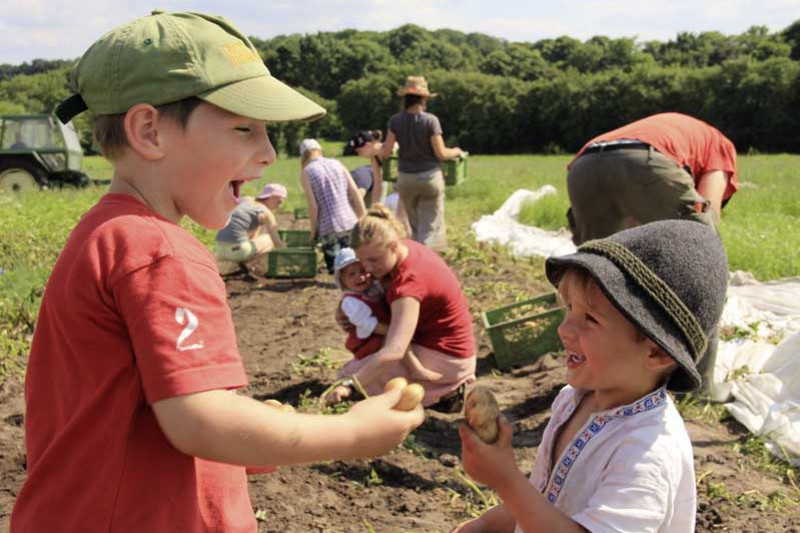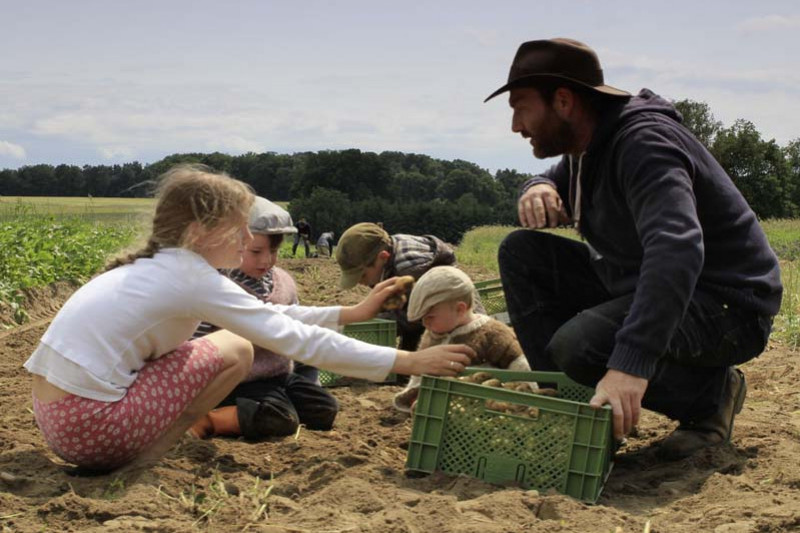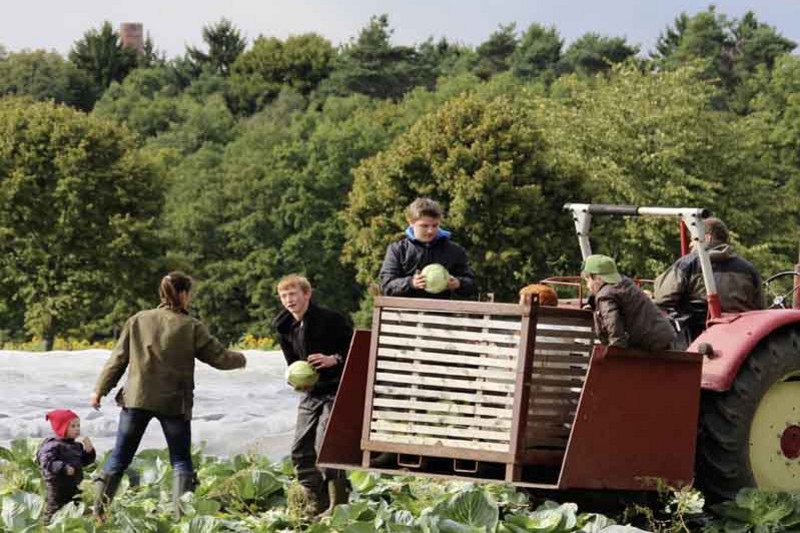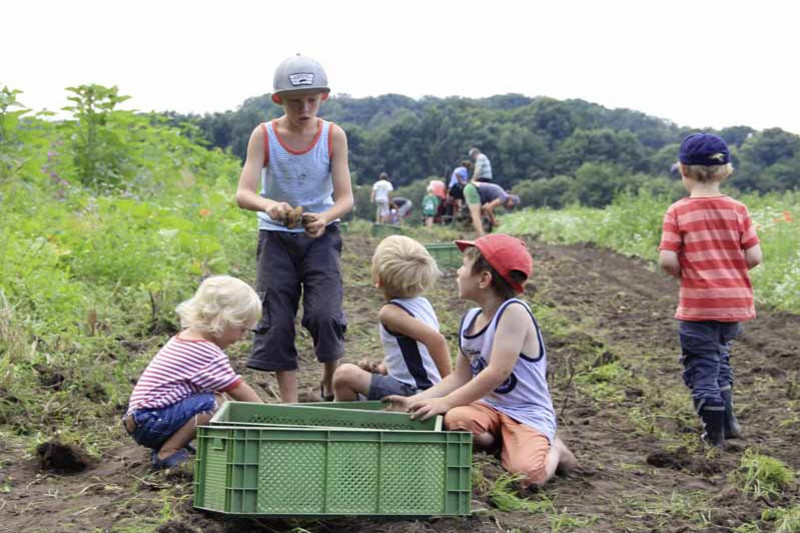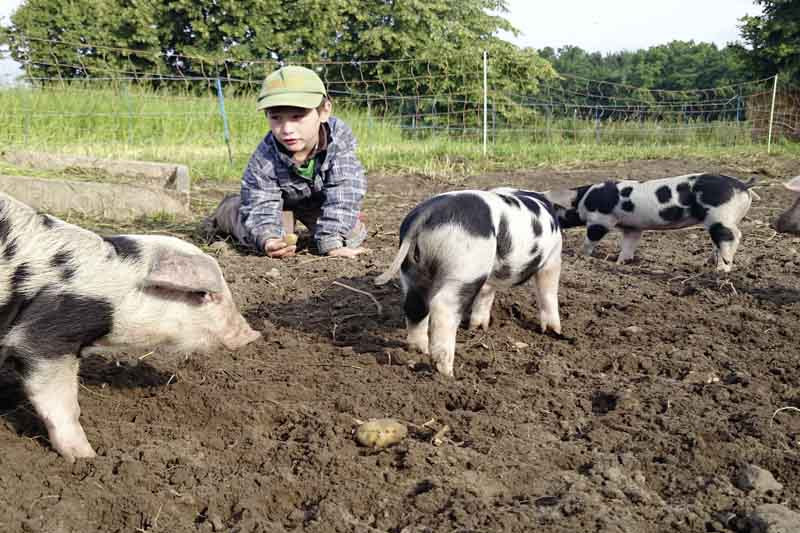The Learning Farm: Deepening Our Understanding of the Natural World
How can learning be designed to take place in real life, and not in an artificially created learning environment? How can agriculture provide a basis for such a learning environment - providing the oft-cited “village” that it takes to raise a child? Dr. Tobias Hartkemeyer has been mulling over these questions for quite some time.
Dr. Hartkemeyer was raised on a farm near Osnabrück with a father who, in addition to running the farm, was involved in education and served as the director of a Volkshochschule. He decided to study both agricultural science and education, and combined both fields in his doctoral dissertation. Searching for an opportunity to combine both of his passions, he and his wife Julia discovered the model of community-based or community-supported agriculture (CSA). According to Hartkemeyer, this model shouldn't really even work: “It can only be successful with the help of many, many people - something which cannot be planned at the outset in the conventional way,” says the farmer and educator.
In his case, the project was successful: with 240 members, Hof Pente is one of the most successful CSA operations in Germany and is frequently mentioned in media articles and television news reports. What's interesting on the project is not just the solidarity agriculture model, but the many initiatives that are made possible as a result. In this interview, Tobias Hartkemeyer explains how new educational and learning projects developed on the farm, and what he intends to accomplish with the “Pedagogical Province” project, which is supported by the Software AG Foundation.
Dr. Hartkemeyer, how did you transform Hof Pente (Pente Farm) to the community-supported agriculture model? And why did you add a second focus, on education?
After studying both agricultural science and education, it was clear to me that I didn't want to become a teacher - or a “normal” farmer. Then I heard about the idea of community-supported agriculture. This struck me immediately as genius: a way to understand and develop a farm as a meeting place. Not a place where a single farmer works in the sweat of his brow, and then tries to somehow bring his products to market and make a profit. Rather, a community-supported farm that is a place of social encounter and a learning environment. Rather, a community-supported farm that is a place of social encounter and a learning environment. For us, it was about finding new ways of community life and learning.
The exciting thing about using agriculture as a place for living and learning is that questions arise that are not just about economics and production technologies. The exciting thing about using agriculture as a place for living and learning is that questions arise that are not just about economics and production technologies. These are very concrete questions, and very concrete people consider how to handle them. To create a place where these different people, from young to old, can come together, can ask these questions in context and learn really professionally - that was and is our goal. That's why, for me, CSA has already meant more than just brotherly economic activity in the agricultural context. Developing the farm as a place of real-life learning, as a university - for me, this is the key and our future.
What do you see as the main differences between standard educational institutions and learning agriculture?
Often, one realises that universities, for example, with their rigid structures and established hierarchies, aren't exactly what you would call a “learning organisation” from an organisational development perspective. Especially on a community farm, this must be different - otherwise the farm just doesn't work. Thinking together and exploring new ideas together are very important here. It's not about abstract theories, but about concrete, practical things for real life. Problems are solved in practice and in collaboration. This is extremely important for understanding living things, living processes - an ability which we as a society have increasingly distanced ourselves from, but which we will need ever more in the future.
What form does educational work on the farm take, concretely?
In addition to adult education in the form of seminars about dialogue as well as seminars for trainees and students (agriculture, gardening and education science), we also have many trainees and interns each year - high school and university students as well as trainees with special needs who have initial difficulties on the job market. Additionally, many of our members assist with the practical, day-to-day work of the farm - these are often people in part-time or full-time retirement. If you include the day care centers, as well, we really have all generations on the farm: a wide spectrum that enables productive, intense collaborative learning and living. In addition, we also publish a monthly “News from the Farm” in which we not only describe the day to day work on the farm, but also provide information ranging from seeds and breeding to global political issues such as the planned free-trade agreement.
“Learning in Real Life”
Does this diversity, this broad spectrum, enable what you call a pedagogy of action?
Yes, that is the basis.The concept of action pedagogy became very clear to me through the example of my own children. When my son started attending the “normal” kindergarden, it was initially like a shock for him. His comment was, “Dad, I don't want to go to kindergarten, I want to become a real man.” This shows that he wanted to continue to participate in “real” life, and wanted to learn through actual work. And that's what we mean with action pedagogy: to move from watching, then to understanding by participation, and finally to personal action - these are learning processes based on meaningful, useful activities. Where can children today spend time with adults who carry out practical activities that are worthy of imitation? On a learning farm, children can gradually participate in and experience how adults, when their work is motivated by a sense of meaning, are able to accept shared responsibility for diversity. This is a process that schools have difficulty replicating.
Did the idea of the “learning village” develop from this experience?
Yes, it did - we want children to be able to be involved in this place over a longer period of time. That's why I'm happy that we were able to make a first significant step in this direction, with the support of the Software AG Foundation, and to start the pilot project. For a time, the farm will become the focal point of all school-related activities for a third-grade class from a neighboring Waldorf school. For this they of course need their own dedicated space on the farm where the “theoretical” instruction can take place - in our case this is a very big yurt. With this as home base, they gradually start participating in groups in the various activities of the farm, together with the staff and members of the farming community. This new pedagogical project won't just be an experience for it's own sake - it will also be documented and shared to allow knowledge transfer in the sense of best practices. The model has attracted great interest from both in terms of educational practice and pedagogy.
One could at this point ask provocatively: will children in a harmonious, idealized environment really be prepared for “real life,” for the competitiveness and the challenges of working life?
First we could ask ourselves, are we the victims of these developments, or do we shape our own reality? If I believe that we can shape our world, then I find it to be of essential importance that we don't just transmit cultural technologies - like reading, writing, maths, and computer skills - to our children. We also have to give them what's behind all that, what motivates us and meaningfully excites us. And that can be learned above all in a living environment that creates a social meeting space, one that includes plants, animals and the earth. After all, the people who come here are working in their free time, without pay, because they want to develop and transform something. The children experience this enthusiasm when they join in - an experience that is enormously important for their development. This helps them to become truly capable of real action. For the ever-increasing challenges that we all experience, such skills are essential. That's why I would say that the learning farm prepares children, in the best sense, for life.
Information about the Project:
The pilot project “educational village” is being carried out in cooperation with the Waldorf school in Evinghausen. Starting in September 2014, for a total of two months, all of the third graders' lessons will take place on the Hof Pente learning farm, and will include the so-called construction and farming era. The project makes use of the active learning environment of the CSA farm. The project will be carried out each year with the third grade class, and will continue to be carried out in a similar way for other classes and schools.
The project will be carried out in a yurt built on the farm grounds, so that the concept can be tested before an investment is made in permanent buildings. The yurt is constructed in Mongolian style, but the floor, walls, and ceiling are insulated. It is covered with waterproof tarpaulin with wood fibers, so that the yurt can remain outdoors even during the local wet conditions in winter. It is heated with a wood stove.
The project's progress will be documented on film and the results evaluated externally, by the Institut Dialog Transnational. The results will be presented at at least four events in Lower Saxony and in a final workshop in Berlin. A book about the project will be released in October 2015.

